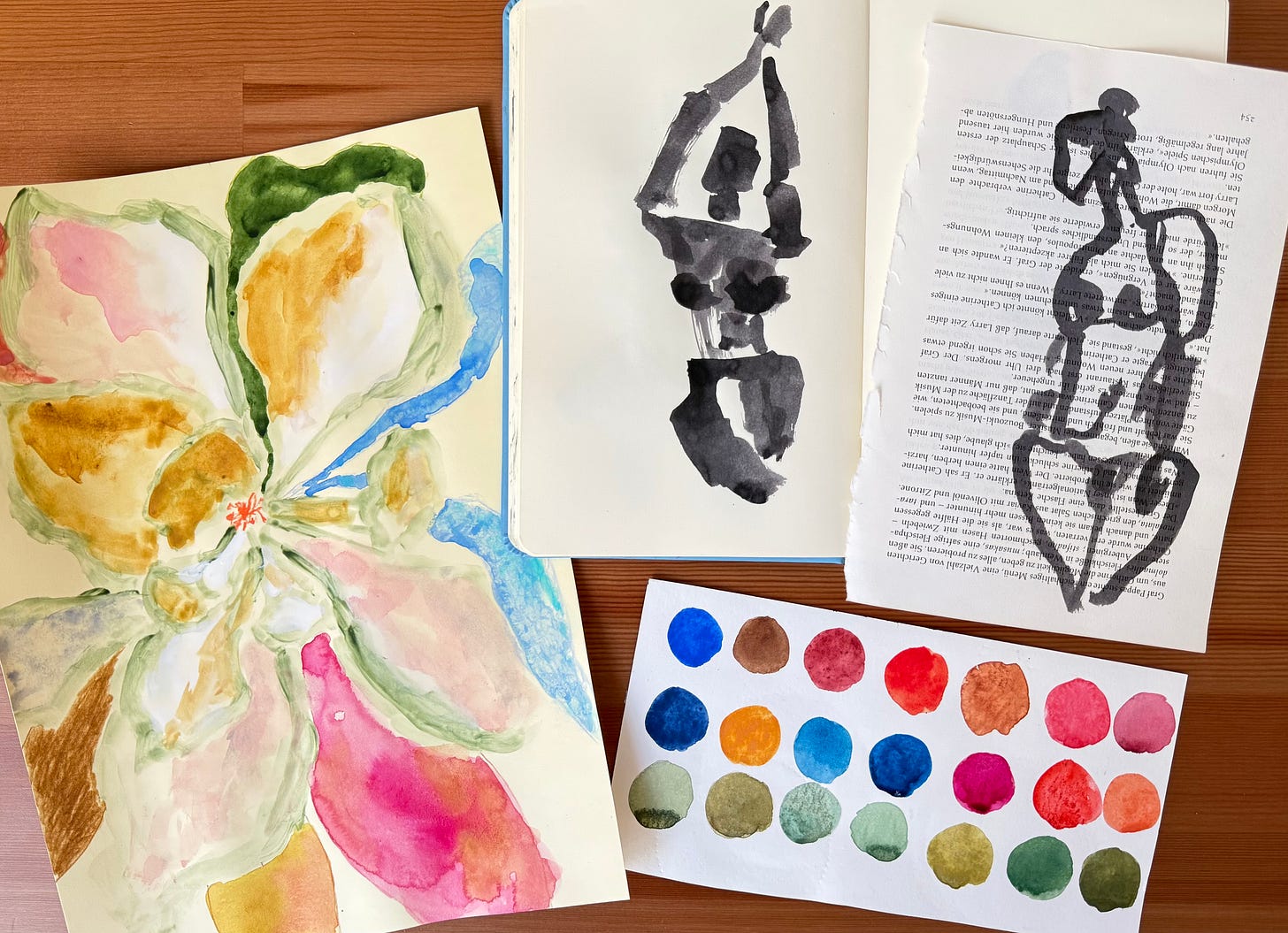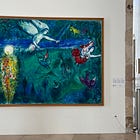What is art
We need more discourse around art
Disclaimer: This is all obviously my subjective opinion. I encourage you to think about this piece as an invitation for a broader discussion.
I recently quoted the German artist Alpay Efe, who said that we as artists are responsible for creating demand for art and we can do so by explaining its importance to people. He shared his experience of going out to a museum with his students where they would be disappointed when seeing a famous work of art, because they couldn’t “understand” it.
This made me think that we really have to create a more open and inclusive discourse around art. I want to share a couple of thoughts and none of what I say is in any way conclusive, so please feel free to join the conversation in the comments.
As a society we sort of don’t have a good general understanding of what art actually is and how to “see” it - both academic and classical as well as experimental and contemporary.
I think that it is relatively easy for us now to look at well-known “old” art and appreciate it in some way (even if we speak about relatively recent art movements like abstract expressionism), because it has been studied for decades. Someone had already done the “analyzing” and wrote the books. In short, the work has been done for us - all we have to do is to recognize the artist and their most famous works. But even in this case Alpay’s example shows that sometimes it still can be difficult to understand “what the fuss is all about”.1
We know Leonardo, Caravaggio, Van Gogh, etc. - some of the greatest artists, but the problem is that we also learn to appreciate their art through the prism of already knowing about them and their importance from the books about them. Someone told us they are important, so the analytical work of understanding, appreciating the art is sort of partially done for us.
I mean, it is a no-brainer that Leonardo was a genius, but my point is not to say something like he wasn’t actually that good (because he obviously was), the point is that we are used to rely on someone’s expertise in determining what counts as art and who is a good or a bad artist.
And this can go different ways.
During his lifetime Van Gogh was struggling to sell his paintings and his brother Theo supported him financially throughout his life. His style was criticized a lot and only after his death, thanks to the work of his sister-in-law, Jo, his artwork started being appreciated by collectors and art experts. The reasons for that are multiple: it’s the way his work was marketed after his death, but also the changing attitudes towards art in the late 19th early 20th century, and so on. Nowadays we have all the possible context about Vincent van Gogh’s life and art and he is very recognizable in popular culture. For many the allure of Van Gogh’s paintings is precisely in that he was misunderstood during his lifetime, but later his paintings became famous and recognized as masterpieces.
I also remember reading a book on Van Gogh’s drawings and being confronted with a paragraph where the critic wrote something along the lines that, well, Van Gogh wasn’t actually that good at drawing, hence, he resorted to this more simple style, he just wasn’t good enough, not as good as Rembrandt. Maybe there is some truth in this claim, maybe there isn’t, but someone will read this paragraph and forever judge Van Gogh’s art from this standpoint.
We are bombarded by these various opinions and stereotypes about Van Gogh and many don’t form their own opinion, because, well, so much has already been written by someone with authority.
It seems that without all the context about an artist’s life and process many people feel lost when it comes to forming opinions about art. I love Van Gogh’s art and he’s one of my favourite artists, but I realize that part of my appreciation of his work is rooted in my knowledge of his life and artistic path. It’s just not the same experience when looking at someone else’s painting of Irises.
I think we need a mindset shift - from trying to recognize “the thing” or focusing on liking the aesthetic of the artwork to understanding why and how it has been created in the first place. We need to focus on our own experiences with the art and the artist as the basis for forming opinions.
The thing with artists is that you do not necessarily know about them until they get big on the art scene - if they do and if they do during their lifetime.
Appreciation of new forms of art has been developing as well as new materials and methods have been brought to the market, which made art and art-making unprecedentedly accessible to a wide number of people. Just imagine the number of artists who are creating their work right now, full-time or otherwise. Some of this artwork may be more classical, more academic in style. Some of it can be more experimental and pushing the boundaries. But because all this additional context and information about these artists is missing from a wider discourse many people feel lost in forming opinions around contemporary art.
You may see a couple of paintings or sculptures, or maybe a performance piece, and you do not “understand” it because you don’t have someone’s opinion to rely on - no one has done the work for you, no one said that this work is good and worth your time. One part of starting to appreciate contemporary art is first of all to let go of this slightly condescending idea that it is strange, difficult to understand and not as good as the old art.
It’s important to just starting to appreciate the pure amount of creativity that exists nowadays in all its various forms, experience as much art as possible, learn about our tastes and form our own opinions.
Only time will show which works will become famous. This is how it always worked, there are different forces at play and some of these forces are more objective, while some are extremely subjective - market forces, trends, taste, connections, social media algorithms and so on.
I believe that, broadly speaking, art mirrors what is happening in society. Art used to be commissioned by rich people, the church and the government, so it consisted of a lot of portraits and religious scenes, for example. Things changed and the function of art changed, but somehow we still think that to be the gold standard.
There was a time when so-called genre paintings, for example, landscapes, were thought to be a lesser form of art comparing to paintings devoted to religious themes. But now we look at these old landscapes and say “oh wow this is so detailed and so beautiful”, we enjoy the classic approach, the academic style of the painting. Our perceptions change all the time and that is why I think a more holistic look at how to understand and appreciate is important.
We need to think about art in terms of the artist’s practice, the context of where, how and why it was created, the function of specific forms of art.
But, first and foremost, we need to learn to experience art as it is, without academics or experts telling us what is good or bad or what is worthwhile to see. We need to learn about our own taste in art, and learn to reflect on what we can learn from these experiences:
Thank you for reading and being a part of this space. If you enjoyed this post, feel free to give it a like, leave a comment, or share it with someone who might appreciate it. I always love hearing from you in the comments - what is art?
If you haven’t yet, consider subscribing to stay connected. Everyone is welcome here!
Until next time!
Lisa
By the way I think it’s okay not to like an artwork, even an old and famous one, my point here is more about how having some context or background information can shift our perception.





When I am sharing my love of making art with my grandchildren, I always tell them that there are no “mistakes” in art, that the “mistakes” are the art. We spend way too much time in our lives trying to be “perfect” at whatever we are doing. Art shouldn’t come from the mind, it should come from our hearts.
A great thought provoking piece Lisa. It is human nature to judge whether we like it or not it happens everywhere in life. Maybe because I haven't studied art i let my eyes take my mind to do the judging. I am guessing this may be common in society.
Notwithstanding it may also need a longer, closer, more detailed look to come to a judgement but a judgement is what happens I'm sure of it. Some people will be honest or more candid in sharing, others less so and more reserved with their judgement. A very interesting discussion on human nature. 🫶